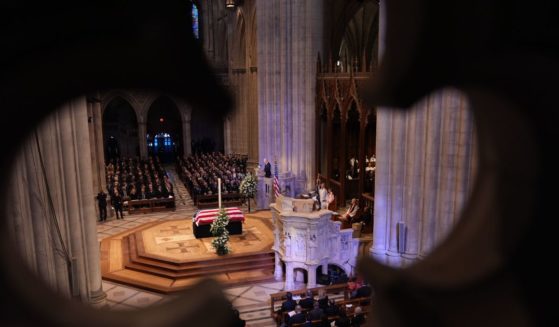Trump Not Entitled to Presidential Immunity in J6 Civil Lawsuits, Federal Appeals Court Rules
A three-judge panel of a federal appeals court ruled Friday that former President Donald Trump is not shielded by presidential immunity from civil lawsuits resulting from the Capitol incursion.
As a result of the decision, lawsuits by Capitol police officers and Democratic members of Congress can move forward, according to CNN. The ruling is not the same as handing those suing Trump a victory; it only means that Trump cannot have all the suits thrown out on the grounds of presidential immunity.
Steven Cheung, a representative of Trump’s 2024 campaign, said the ruling was “limited, narrow and procedural.”
“The facts fully show that on January 6 President Trump was acting on behalf of the American people, carrying out his duties as President of the United States,” Cheung said in a statement.
As noted by NBC, Trump can appeal the three-judge panel’s decision to the full Appeals Court. If Trump loses there, he can seek to have his case heard by the U.S. Supreme Court.
The ruling from Chief Judge Sri Srinivasan sought to create a barrier between acts Trump took as president, which would be covered by immunity, and those he took as a candidate, which it said were not.
“The object of a President’s official-act immunity is to assure that he can fearlessly and impartially discharge the singularly weighty duties of the office. The President, though, does not spend every minute of every day exercising official responsibilities. And when he acts outside the functions of his office, he does not continue to enjoy immunity from damages liability just because he happens to be the President,” the ruling began.
The ruling noted that it is not passing judgment on the merits of any claims against Trump.
“The sole issue before us is whether President Trump has demonstrated an entitlement to official-act immunity for his actions leading up to and on January 6 as alleged in the complaints. We answer no, at least at this stage of the proceedings,” the ruling said.
“When a first-term President opts to seek a second term, his campaign to win re-election is not an official presidential act. The Office of the Presidency as an institution is agnostic about who will occupy it next. And campaigning to gain that office is not an official act of the office,” the ruling said, noting that political activities a president takes during a campaign are not official presidential acts.
The ruling sought to use Trump’s own words against him, noting that when Trump went to the Supreme Court to overturn the 2020 election he “expressly filed his motion in the Supreme Court ‘in his personal capacity as candidate for re-election to the office of President’ rather than in his official capacity as sitting President.”
The ruling said Trump “does not dispute that he engaged in his alleged actions up to and on January 6 in his capacity as a candidate. But he thinks that does not matter. Rather, in his view, a President’s speech on matters of public concern is invariably an official function, and he was engaged in that function when he spoke at the January 6 rally and in the leadup to that day.”
“We cannot accept that rationale. While Presidents are often exercising official responsibilities when they speak on matters of public concern, that is not always the case,” the panel ruled.
“When a sitting President running for re-election speaks in a campaign ad or in accepting his political party’s nomination at the party convention, he typically speaks on matters of public concern. Yet he does so in an unofficial, private capacity as office-seeker, not an official capacity as office-holder. And actions taken in an unofficial capacity cannot qualify for official-act immunity,” the ruling said.
The ruling noted that although Trump is not entitled to blanket immunity, as lower courts hear the civil cases against him, “he must be afforded the opportunity to develop his own facts on the immunity question if he desires to show that he took the actions alleged in the complaints in his official capacity as President rather than in his unofficial capacity as a candidate. “
“Because our decision is not necessarily even the final word on the issue of presidential immunity, we of course express no view on the ultimate merits of the claims against President Trump,” the ruling said, adding, “Nor does our decision on a President’s official-act immunity from damages liability in a civil suit treat with whether or when a President might be immune from criminal prosecution.”
“In the proceedings ahead in the district court, President Trump will have the opportunity to show that his alleged actions in the runup to and on January 6 were taken in his official capacity as President rather than in his unofficial capacity as presidential candidate,” the ruling added.
Truth and Accuracy
We are committed to truth and accuracy in all of our journalism. Read our editorial standards.
Advertise with The Western Journal and reach millions of highly engaged readers, while supporting our work. Advertise Today.












